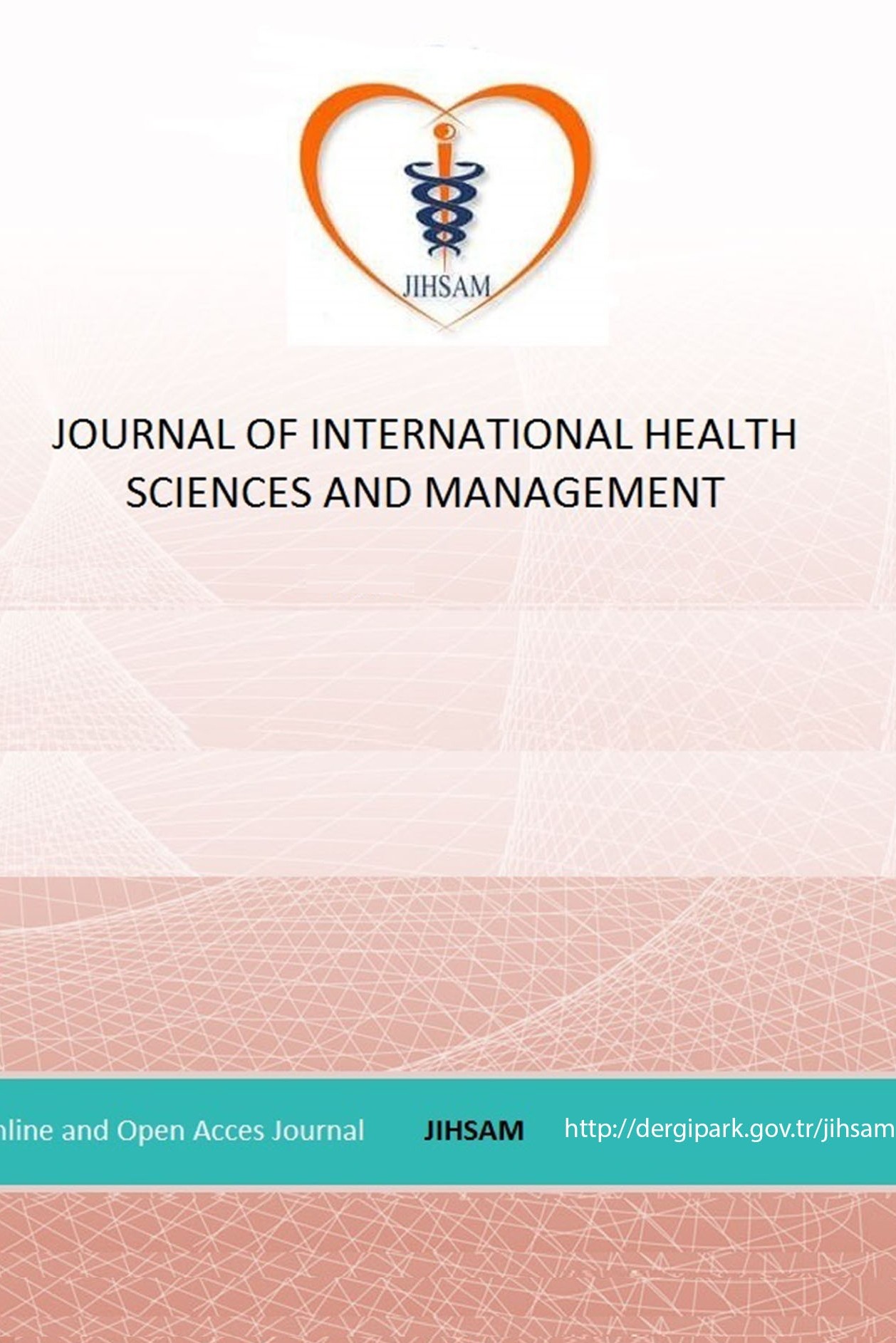MOLECULAR DIAGNOSTIC LABORATORY SETUP AND MAINTENANCE FOR SARS-COV-2
MOLECULAR DIAGNOSTIC LABORATORY SETUP AND MAINTENANCE FOR SARS-COV-2
covid-19 laboratory disaster planning, , laboratory staff, personal protective equipment, Sars-CoV-2,
___
- Aberaa A, Belaya H, Zewudea A. Establishment of COVID-19 testing laboratory in resource-limited settings: challenges and prospects reported from Ethiopia. Global Health Action 2020;13(1):1841963. doi: 10.1080/16549716.2020.1841963
- Blasco-Belled A, Tejada-Gallardo C, Fatsini-Prats M, Alsinet C. Mental health among healthcare workers during COVID-19 pandemic in Thailand. Curr Psychol.2022;1:1-12. DOI: 10.1007/s12144-022-02913-6
- CDC 2019-Novel Coronavirus (2019-nCoV) RealTime RT-PCR Diagnostic Panel,2020. Atlanta: Centers for Disease Control and Prevention. Accessed 12 Jun 2022.
- Chin A, Chu J, Perera M, et al. Stability of SARS-CoV-2 in different environmental conditions. Lancet Microbe.2020; 1(1):e10.
- Clinical and Laboratory Standards Institute (CLSI). Training and competence assessment, 4th ed. CLSI guideline QMS03. Wayne, PA: Clinical and Laboratory Standards Institute, 2016.
- COVID-19 (SARS-CoV-2 Infection) Laboratory Biosafety Guide. TR Ministry of Health, General Directorate of Health Services, Department of Examination and Diagnostic Services, Medical Laboratories Science Commission, 8 April 2020.Turkish
- Finch TJ, Crowell A, Bhatia M, et al. Continuously updated forecasting of SARS-CoV-2 in a regional health system. Am J Manag Care. 2022;28(3):124-130. doi: 10.37765/ajmc.2022.88838.
- Jafri L, Ahmed S, Siddiqui I. Impact of COVID-19 on laboratory professionals-A descriptive cross-sectional survey at a clinical chemistry laboratory in a developing country. Ann Med Surg (Lond). 2020;57: 70-75.
- Linster, M., Ng, B., & Vijayan, V. (2020). COVID-19 and Beyond: Safety and Design Considerations for the Development of a Mobile Biocontainment Laboratory. Applied biosafety : journal of the American Biological Safety Association, 25(3), 169–173. https://doi.org/10.1177/1535676020943394
- Lippi G, Plebani M. The critical role of laboratory medicine during coronavirus disease 2019 (COVID- 19) and other viral outbreaks. Clin Chem and Lab Med.2020;58(7):1063-1069.
- Lippi G, Plebani M. Laboratory medicine resilience during coronavirus disease 2019 (COVID-19 ) pandemic. Adv Lab Med . 2020;20200035. doi:10.1515/almed-2020-0035
- Lippi G. Current laboratory diagnostics of coronavirus disease 2019 (COVID-19). Acta Biomed. 2020;91(2):137-145.
- Liu R, Han H, Liu F, et al. Positive rate of RT-PCR detection of SARSCoV-2 infection in 4880 cases from one hospital in Wuhan, China, from Jan to Feb 2020. Clin Chim Acta. 2020;505:172-175.
- Ortiz M, Mario Grijalva M. Biosafety at Home: How to Translate Biomedical Laboratory Safety Precautions for Everyday Use in the Context of COVID-19. Am. J. Trop. Med. Hyg. 2020;103(2), 838–840.
- Republic of Turkey Ministry of Health COVID-19 Information Platform. https://covid19.saglik.gov.tr/TR68720/covid-19-yetkilendirilmis-tani-laboratuvarlari listesi.html. Accessed 6 Jun 2022. Turkish
- Sharma B, Shahanshah MF, Gupta S, Gupta V. Recent advances in the diagnosis of COVID-19: A bird's eye view. Expert Rev Mol Diagn.2021; 21(5): 475-491.
- Tahamtan A, Ardebili A. Real-time RT-PCR in COVID-19 detection: issues affecting the results. Expert Rev Mol Diagn. 2020;20(5):453-454.
- Tan W, Zhao X, Ma X, et al. A novel coronavirus genome identified in a cluster of pneumonia cases-Wuhan, China 2019. China CDC Weekly. 2020;2(4): 61-2.
- van Doremalen N, Bushmaker T, Morris DH, et al. Aerosol and surface stability of SARS-CoV-2 as compared with SARS-CoV-1. N Engl J Med. 2020; 382(16), 1564-1567.
- Waste Management in the COVID-19 Pandemic, TR Ministry of Health (2020). Accessed 6 Jun 2022.Turkish Williams TL, Potenza G, Paz Carlos M, et al. GP36-A Planning for Laboratory Operations During a Disaster; Approved Guideline. 2014; 34(19).
- World Health Organization. Coronavirus Disease (COVID-19) Situation Report, 2022. https://www.who.int/publications/m/item/weekly-operational-update-on-covid-19. Accessed 6 Jun 2022. World Health Organization, Laboratory biosafety guidance related to coronavirus disease (COVID-19): Geneva,2020: World Health Organization. Interim Guidance; 19 May 2022. Accessed 6 Jun 2022.
- World Health Organization. Guidance on regulations for the transport of infectious substances 2019– 2020: applicable from 1 January 2019 (No. WHO/WHE/CPI/2019.20). Geneva: World Health Organization; 2019. Accessed 6 Jun 2022.
- World Health Organization. Rational use of personal protective equipment (PPE) for coronavirus disease (COVID-19): interim guidance, 19 March 2020 (No. WHO/2019-nCoV/IPC PPE_use/2020.2). Geneva: World Health Organization.
- World Health Organization. Infection prevention and control during health care when coronavirus disease (COVID-19) is suspected or confirmed: interim guidance, 29 June 2020 (No. WHO/2019-nCoV/IPC/ 2020.4). Geneva: World Health Organization; 2020. Accessed 6 Jun 2022.
- Yayın Aralığı: Yılda 2 Sayı
- Başlangıç: 2015
- Yayıncı: Sedat BOSTAN
MOLECULAR DIAGNOSTIC LABORATORY SETUP AND MAINTENANCE FOR SARS-COV-2
Burcu GÜRER GİRAY, Gökçe GÜVEN AÇIK, Yunus Emre BULUT, Asiye Çiğdem ŞİMŞEK, Mustafa Sırrı KOTANOĞLU
Gülseren GÜNAYDIN, Mustafa GÜNAYDIN
Ontario's Digital Health Vision in the post-COVID-19 Pandemic Era: A Canadian Perspective
